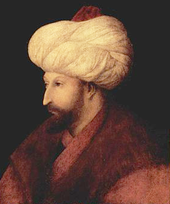Stephen Tomašević of Bosnia
An attempt to expand into Croatia by marrying Stephen to a wealthy noblewoman failed, and negotiations for a marital alliance with the Sforzas of Milan were abandoned when a more prestigious opportunity presented itself: marriage to the heiress Maria of Serbia.After ruling it for merely two months, he surrendered it to the encroaching Ottoman forces and fled back to his father's court, which earned him the contempt of the Hungarian king Matthias Corvinus and other Christian rulers in Europe.Thomas was politically inactive and did not take part in the struggle between his brother and cousin, enabling his family to lead a quiet life in a period when the Ottomans tried to weaken the Kingdom of Bosnia by encouraging internal divisions.[4] At about that time, likely in order to allow for a peaceful solution to his protracted war with the magnate Stjepan Vukčić Kosača, King Thomas requested from Pope Eugene IV an annulment of his union with Stephen's mother.Kosača too hastened to marry the wealthy widow, leading to an armed conflict, but neither prevailed due to an intervention by the Republic of Venice on behalf of Talovac's heirs.[12] Michael Szilágyi, regent for the underage King Matthias, arrived at the head of an army to ensure that command over the town's fortress would be assumed by Stephen without any difficulties.[12] King Thomas boasted to the Duke of Milan that his son had been made despot "with the agreement and will of all the Rascians", but Stephen's regime was not particularly popular; chroniclers writing about his treatment of his wife's uncle cursed him as a schismatic.[16] Following the fall of the town which Pope Pius II lamentably termed "the gateway to Rascia", Stephen fled to Bosnia with his family and in-laws, seeking refuge at the court of his father.[19] The Serbian-born janissary Konstantin Mihailović and the Byzantine Greek scholar Laonikos Chalkokondyles maintained Stephen's innocence and pointed out to the strength of the Ottoman army.Both state that the Serbs within Smederevo were so unhappy with Bosnian rule and convinced that the Ottomans would prevail (and grant them more religious tolerance than the Hungarians) that they went out to meet Mehmed and presented him with keys to the city.[21] The new monarch assumed the pompous title inherited from Tvrtko I, the first Bosnian king, styling himself as, "by the Grace of God, King of Serbia, Bosnia, the Maritime Lands, Zachlumia, Dalmatia, Croatia, and the Western lands" – regardless of the fact that Serbia had by then become an Ottoman pashaluk, that Croatia had been lost to Hungary in the 1390s, and that he had to beg the government of the Republic of Venice to allow him to take refuge in Dalmatia in case of an Ottoman attack.[25] It exemplified how, with the religious persecution established by Thomas and with Stephen's active correspondence with the papacy, the Kingdom of Bosnia acquired the character of a true Catholic state only at its very end.The King maintained contact with the Pope, who had his legates stay permanently at the Bosnian royal court and who strived to concentrate as many soldiers and as much weapons as possible in the threatened kingdom.According to a contemporary, Stephen generously bestowed gifts and honors in order to inspire loyalty, and awarded fortified towns to untrustworthy people, even including former "heretics".Pope Pius wrote in his diary that, "relying on one knows what hope", the King "refused the tributes which his ancestors had long been used to pay the Ottomans and had stormed the town which the enemy had built at the confluence of Sava and Bosna to put fear into the Hungarians and Slavs.Stephen fearfully brought Angelović's document,[34] but Mehmed's Persian-born mullah, Ali al-Bistami, issued a fatwah declaring that the Sultan was not bound to keep the promise made by his servant without his knowledge.The country's quick submission is said to be the consequence of a poor cooperation between Stephen and his noblemen, but it is perhaps most accurate to attribute it to the people's low morale and general belief that the conquest was inevitable.[26] Additionally, the religiously diverse Bosnians were aware, much like the neighbouring Serbians, that the country would be overrun by Hungary if not by the Ottomans, and that they would enjoy far less freedom of religion and far higher taxes in that case.Queen Catherine, his stepmother, left for the Papal States and unsuccessfully campaigned for the restoration of the kingdom; Bosnia only ceased to be part of the Ottoman Empire in 1908, 445 years after Stephen's death.[36][35] In 1888, the Croatian archeologist Ćiro Truhelka excavated bones in a settlement close to Jajce known as Kraljev Grob (meaning King's Tomb) and found the skeleton of a decapitated adult male.Despite objection from the friar Antun Knežević, who argued for leaving the bones where they had laid for centuries and constructing a small church at the site, the skeleton was placed in a glass coffin in the right aisle of the Franciscan monastery in Jajce.



Lovro DobričevićKing of BosniaCoronationThomasDespot of SerbiaStephenCarevo PoljeBosniaFranciscan monastery of Saint Luke, JajceMaria of SerbiaKotromanićThomas, King of BosniaVojačaRoman CatholicSerbo-CroatianKotromanić dynastyKing ThomasCroatiaSforzasKingdom of BosniaSerbian DespotateOttoman EmpireCatholicismOrthodoxMatthias CorvinusHoly SeePope Pius IIChristendomMehmed the ConquerorHouse of KotromanićadulterineKing OstojaRadivojKing Tvrtko IIOttomansencouraging internal divisionsBosnian ChurchRoman CatholicismStjepan Vukčić KosačaPope Eugene IVCatherineSigismundallodial landPetar TalovacCroatia properRepublic of VenicePope Callixtus IIIWestern worldFrancesco I SforzaDuke of MilanLazar BrankovićinterregnumblindedHelen Palaiologinabuffer zonevassal statesDiet of HungaryBobovacSmederevoEastern OrthodoxHoly WeekMichael Szilágyithe town's fortressfirst Sunday following EasterdespotByzantine emperorRasciansschismaticHodidjedRasciajanissaryKonstantin MihailovićLaonikos Chalkokondylesreligious toleranceTvrtko Iby the Grace of GodMaritime LandsZachlumiaDalmatiaWestern landsOttoman pashalukPavao ŠpirančićOstrovicacrusadingcoronation crownSaint Gregory ThaumaturgusDefenderpapal legateNicholas of ModrušChurch of Saint Maryreligious persecutionsanctificationJohn VitézCrown of St StephenEmperor Frederick IIIGentile BelliniRepublic of RagusaSkanderbegVenetian AlbaniaFerdinand I of Naplesmoral supportfortified townsVladislav HercegovićNicholas VAdrianopleMahmud Pasha AngelovićBattle of Kljuc (1463)Ključfour-day-long siegemullahAli al-BistamifatwahBenedetto Deiflayedshooting targetmoralereligiously diverse Bosniansfreedom of religionPapal Statesceased to be part of the Ottoman EmpireĆiro Truhelkatwo coins in the mouthAntun KneževićFranciscan monastery in JajceOstojaKosača